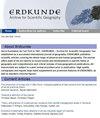The rise of guesthouse tourism in the Greater Caucasus and the effects of the covid pandemic. The example of Lagodekhi town and its Protected Area, Georgia
IF 1.1
4区 社会学
Q3 GEOGRAPHY
引用次数: 0
Abstract
In Georgia, tourism has become a key sector of the economy, especially since the country opened up for private investment after independence in 1991. Guesthouses, the focus of this paper, present a typical example of such private investment. In dealing with this sector, we adopt a synoptic view, and look into development over time, services offered, motives for hosting guests, outcomes, and the effects of the COVID pandemic. Geographically, our focus is on the town of Lagodekhi and its Protected Area (PA) on the foot slope of the Greater Caucasus. Our methods included a review of literature, followed by a questionnaire survey in 2018 among all 23 guesthouses in the town, covering qualitative as well as quantitative aspects of the sector. To follow up on the effects of the pandemic, which reached the area in 2020, we did a re-survey among all houses in June 2021. The results show that all guesthouses are owner-occupied and family-run, with women taking the lead, following traditional gendered labour division. The owners see themselves as paid service providers but also as hosts, who offer insights into local culture free of charge based on traditional hospitality. We posit that this dual role is a unique selling proposition, distinguishing the sector from mass tourism, and presenting an ideal complement to the nature-based attractions of the PA. The COVID pandemic led to an almost total collapse of this sector, especially relating to foreign guests, by far the most numerous visitor group. But the guesthouses remain positive about the future and continue to invest in their houses. To conclude our paper, we present ideas relating to the future of guesthouse tourism in the study area, based on experience before and with the pandemic.大高加索地区宾馆旅游业的兴起以及新冠肺炎疫情的影响。乔治亚州拉戈德基镇及其保护区的例子
在格鲁吉亚,旅游业已成为经济的一个关键部门,特别是自该国1991年独立后向私人投资开放以来。宾馆,本文的重点,提出了一个典型的例子,这样的私人投资。在处理这一行业时,我们采用了一种概括的观点,并研究了一段时间以来的发展、提供的服务、接待客人的动机、结果以及新冠肺炎疫情的影响。从地理位置来看,我们的重点是位于大高加索山脚下的拉戈德基镇及其保护区(PA)。我们的方法包括回顾文献,然后在2018年对该镇所有23家宾馆进行问卷调查,涵盖了该行业的定性和定量方面。为了跟进2020年疫情对该地区的影响,我们在2021年6月对所有房屋进行了重新调查。结果表明,所有宾馆都是业主自住和家庭经营,由妇女主导,遵循传统的性别分工。业主将自己视为付费服务提供商,但也视为东道主,他们在传统好客的基础上免费提供对当地文化的见解。我们认为,这种双重角色是一种独特的销售主张,将该行业与大众旅游业区分开来,并为PA以自然为基础的景点提供了理想的补充。新冠肺炎疫情导致该行业几乎完全崩溃,尤其是与外国客人有关的行业,这是迄今为止数量最多的游客群体。但这些宾馆对未来仍持乐观态度,并继续对自己的房子进行投资。最后,我们根据疫情前和疫情后的经验,提出了与研究地区宾馆旅游未来相关的想法。
本文章由计算机程序翻译,如有差异,请以英文原文为准。
求助全文
约1分钟内获得全文
求助全文
来源期刊

Erdkunde
地学-自然地理
CiteScore
2.00
自引率
7.10%
发文量
17
审稿时长
>12 weeks
期刊介绍:
Since foundation by Carl Troll in 1947, ''ERDKUNDE – Archive for Scientific Geography'' has established as a successful international journal of geography. ERDKUNDE publishes scientific articles covering the whole range of physical and human geography. The journal offers state of the art reports on recent trends and developments in specific fields of geography and comprehensive and critical reviews of new geographical publications. All manuscripts are subject to a peer-review procedure prior to publication. High quality cartography and regular large sized supplements are prominent features of ERDKUNDE, as well as standard coloured figures.
 求助内容:
求助内容: 应助结果提醒方式:
应助结果提醒方式:


